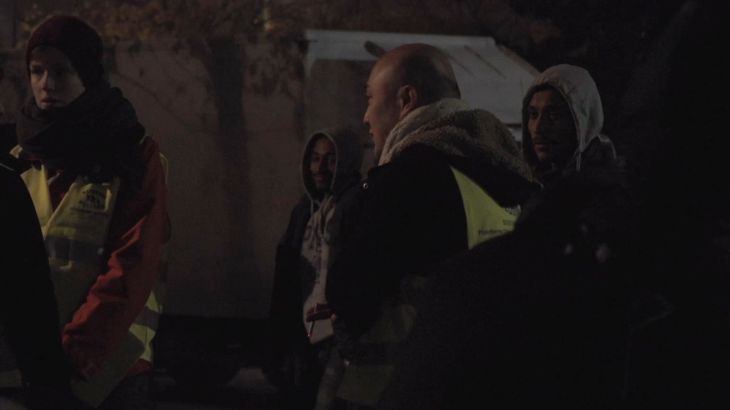Brussels’ Refugee BnB
Why Belgians across the country are housing refugees and migrants in their homes.

Brussels, Belgium – Yoon Daix leads something of a double life.
By day, the friendly 43-year-old manages a team of call centre agents in a corporate office.
Keep reading
list of 4 itemsUN report charts lethal cost of migration over past decade
Conflict, climate, corruption drive Southeast Asia people trafficking: UN
Bodies of three Rohingya found as Indonesia ends rescue for capsized boat
When he clocks off at 5pm, Yoon takes the metro home, makes himself a coffee and then heads to Maximilian Park in northern Brussels.
By 8pm, a crowd of undocumented refugees – mostly young men but also some women and young children from countries such as Syria, Iraq, Eritrea, South Sudan and Ethiopia – have gathered in the dimly lit park.
Many know Yoon and greet him with a big smile and a hug.
For the rest of the evening, often until after midnight, Yoon and a core group of volunteers will stay at the park, assigning homes where the undocumented men, women and children will sleep while Belgian citizens turn up to collect their guests for the night.
“What we do is really make a link between the refugees who are in Belgium and not being offered any kind of support or help by our authorities and Belgian families who cannot stand knowing that many people are sleeping in the cold,” Yoon says.
Each night, the volunteers try to house 300 to 400 people.
![Volunteers try to find a safe place to sleep for undocumented men, women and children each night in a park in Brussels, Belgium. [Al Jazeera]](/wp-content/uploads/2018/01/32d4e70ab5f94fdbaf3c9aabaed02c00_18.jpeg)
In the past few months, the citizens’ solidarity and hosting movement has grown quickly.
In late August, Yoon joined an initial call-out to help find nightly hosts for some 30 women and children after mass arrests of undocumented people sleeping in the park.
Before long, so many citizens were offering spots in their homes that the volunteers decided to try to find beds for everyone.
The closed Facebook group, where all the organising happens, now has nearly 27,000 members from towns and cities across Belgium.
The Facebook page for the “citizen hosting platform” group is constantly humming: members offer beds or to drive guests (most refugees don’t have the money to take public transport and also fear being arrested) to their hosts’ homes, they ask questions (Is it safe? What should I make for breakfast?), and share information and their experiences.
The citizens represent a cross-section of Belgian society.
They are young, retired, single, couples, families with young children, students who live in shared flats and even a hotelier who puts refugees up in his hotel.
Some of the guests have become so close to their hosts that they have given them the keys to their house.
Many individuals want to go to the UK, not realising that they can apply for asylum in Belgium.
Those who gather in the park, with little else but the donated clothes they’re wearing, say the warmth they’ve encountered in Brussels is unique compared with their experiences of other EU countries.
“The people [here] really know what human rights mean,” said a 24-year-old South Sudanese man who was shivering one night in the park.
“When I see my brothers are in a safe place I feel good.”
The volunteers see their platform as also countering anti-refugee sentiment in the country and a means of putting pressure on local politicians to ensure that refugees and migrants are not “invisible” and can access basic information and assistance.
Filmmakers: Victoria Baux and Annette Ekin
Executive Producer: Andrew Phillips